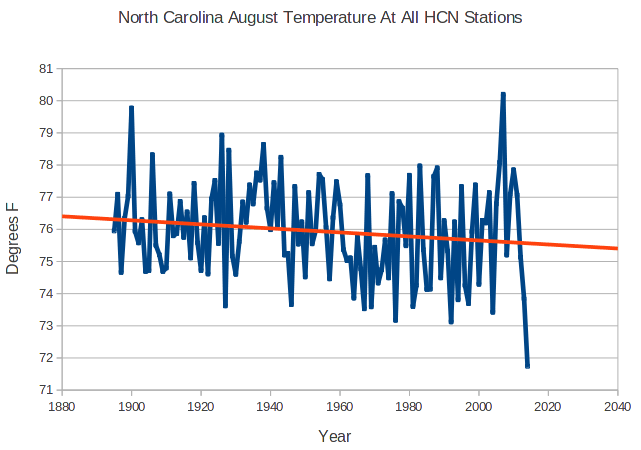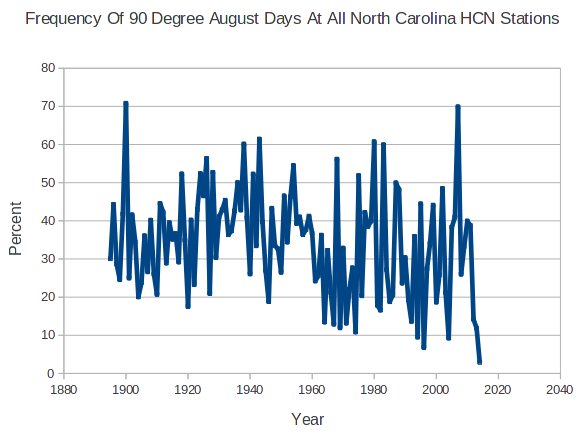Some years, 70% of North Carolina August temperatures are over 90 degrees. This year it is only 3%.
Disrupting the Borg is expensive and time consuming!
Google Search
-
Recent Posts
- “Earlier Than Usual”
- Perfect Correlation
- Elon’s Hockey Stick
- Latest Climate News
- “Climate dread is everywhere”
- “The Atmosphere Is ‘Thirstier.’”
- Skynet Becomes Self Aware
- “We Have To Vote For It So That You Can See What’s In It”
- Diversity Is Our Strength
- “even within the lifetime of our children”
- 60 Years Of Progress in London
- The Anti-Greta
- “a persistent concern”
- Deadliest US Tornado Days
- The Other Side Of The Pond
- “HEMI V8 Roars Back”
- Big Pharma Sales Tool
- Your Tax Dollars At Work
- 622 billion tons of new ice
- Fossil Fuels To Turn The UK Tropical
- 100% Tariffs On Chinese EV’s
- Fossil Fuels Cause Fungus
- Prophets Of Doom
- The Green New Deal Lives On
- Mission Accomplished!
Recent Comments
- conrad ziefle on “Earlier Than Usual”
- Gordon Vigurs on “Earlier Than Usual”
- Bob G on “Earlier Than Usual”
- MLH on “Earlier Than Usual”
- Gordon Vigurs on Perfect Correlation
- Jack the Insider on “Earlier Than Usual”
- Bob G on “Earlier Than Usual”
- John Francis on “Earlier Than Usual”
- John Francis on “Earlier Than Usual”
- Terry Shipman on “Earlier Than Usual”




Sometime after January 20, 2017 I hope you get an opportunity to testify before congress.
While the humidity is still a bit high (as always), it has been nice down here in God’s country…
Yep, sir. As we set “cold” records, we’re still wearing shorts!
I actually put on big boy paints for a couple days last week, as the high was in the mid 60’s….
Paints? I prefer the cloth version. 😉
And loving it! Low humidty
Did you hear the one about the guy that goes to buy a suit?
http://wp.me/p4JijN-3j
http://wp.me/p4JijN-4y
You’ve got some pretty fundamental confusion, solvingtornadoes.
In your comments at that first link you wrote that “moist air at ambient temperatures contains no steam.” That is nonsensical. Steam is just water vapor. Moist air, by definition, is air which contains water vapor.
You also wrote that, “water vapor is heavier (not lighter) than dry air,” and “Moist air, therefore, is HEAVIER, than dry air.”
That’s wrong, too. Moist air is lighter than dry air at the same temperature and pressure.
It is easy to calculate how much lighter moist air is than dry air:
One molecule of H2O has molecular weight of 1+1+16 = 18.
By volume, dry air is 78% N2, 21% O2, and 1% Ar.
One molecule of N2 has molecular weight of 14+14 = 28. One molecule of O2 has molecular weight of 16 + 16 = 32. One molecule of Ar has atomic weight = its molecular weight = 40.
So dry air has an average molecular weight of (0.78 x 28) + (0.21 x 32) + (0.01 x 40) = 28.96. Since 28.96 / 18 ≅ 1.61, the average molecular weight of dry air is 61% heavier than the molecular weight of water.
18 / 28.96 ≅ 0.62, so, for a given temperature & pressure (or partial-pressure) at which all are gaseous, water vapor is just 62% as dense as dry air.
That means humid air must be correspondingly less dense than dry air, according to the proportion of air molecules which are H20, if temperature and pressure are equal. For example, if a particular humid atmosphere consists of 2% H2O vapor and 98% dry air, then the atmosphere’s density will be (0.98 + (0.62 x 0.02)) = 99.24% of the density of dry air at the same temperature and pressure.
That’s a small difference, compared to the differences in density which result from changes in temperature and pressure with altitude. But it is nevertheless a fact that, at a given temperature and pressure, humid air is lighter than dry air.
(Of course, foggy or cloudy atmosphere is another matter, because it also contains droplets of liquid water.)
Many arguments on the golf course with people who hit weak shots and blame the humidity.
BTW . . . we owe our existence to humid air being lighter, so it rises and forms clouds and rain.
I’ve been here in NC for over 30 years. Most summers are pretty brutally hot and dry, with water rationing imposed by sometime in July, and by mid-August people are praying for a small hurricane.
But not lately. Last summer was unusually mild (cool and wet), and this summer is even milder (cooler and wetter). It’s easily the mildest summer I’ve ever seen here. I’m lovin’ it!
Man-Made Global Warming – just another term for nice weather
Yes it has been very mild and wet. At present it is 58.4 °F with mist. (This is August?)
Yesterday I saw puffballs (Calvatia) covered with mold. So I am not kidding when I say the mold (fungi) has mold it is so damp here this year.
I am not sure what this will do to crop harvesting this year.
Fungi do nothing good in the crops….. The race at harvest time is usually to harvest before the fungi set in.
Due to the excessive damp here, the standing white clover here has fungi. You wouldn’t dare cut that for hay.
It’s been one of the coldest wettest summers in the last 10 years in Haute Vienne France, especially so in August so far.
Yes, likewise down the road in Correze. I’ve been here through eight summers, and this has been the coolest and wettest, but I suppose it’s just “weather”.
There is an awful lot of activity locally, with folk stocking up early with extra firewood for the winter (we don’t usually do that until September/October). Do they know something we don’t?
Not really, it’s just one learns to take advantage of the cooler days every change you get…
I live in NC and can confirm this summer has been unusually mild. We had some days in late July and early August with 70 for the high, which I have never seen before.
Back in 1981 one cold November night/early morning I suffered my first bout with hypothermia in N. Carolina while in phase I of SF training. Doesn’t require freezing temps. Just be forced to be immobile for 4 hours of so laying in the prone position on the ground in an ORP in 40 deg weather. Didn’t require treatment but a buddy had to help me stand up as we got ready to carry out our raid. Once I was moving the uncontrollable shivering stopped and I got better. It was the last operation of that phase of training and I have never felt as euphoric again as I did as we marched back towards Camp MacKall that early morning after the After Action critique knowing that I had made it through. 201 had started 6 weeks earlier and 89 of us were left at the end of that first phase. We that remained had a long way to go and a whole lot more would be washed out before it was over but the first great hurdle had been cleared. Several guys I had thought would have no trouble making it weren’t there for that march and there were at least a couple in that formation that I had thought didn’t have a chance in hell of making it.
I have been in Pine Knoll Shores all week. We have vacationed here every summer for 25 years. This year the weather has been terrific, no scorching heat as in earlier years. Anecdotal , I know, but a data point.